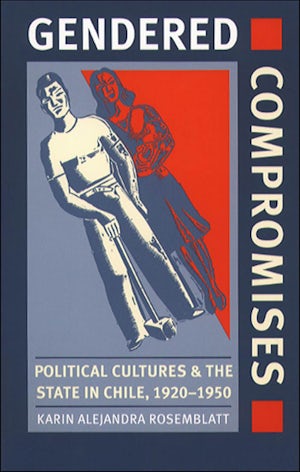Gendered Compromises
Political Cultures and the State in Chile, 1920-1950
By Karin Alejandra Rosemblatt
368 pp., 6.125 x 9.25, 9 illus., 7 tables, appends., notes, bibl., index
-
Paperback ISBN: 978-0-8078-4881-4
Published: November 2000 -
E-book EPUB ISBN: 978-0-8078-6095-3
Published: June 2003 -
E-book PDF ISBN: 979-8-8908-6975-3
Published: June 2003
Buy this Book
- Paperback $47.50
- E-Book $29.99
For Professors:
Free E-Exam Copies
Awards & distinctions
2000 First Book Prize, Berkshire Conference of Women Historians
Rosemblatt examines how and why the aims of feminists, socialists, labor activists, social workers, physicians, and political leaders converged around a shared gender ideology. Tracing the complex negotiations surrounding the implementation of new labor, health, and welfare policies, she shows that professionals in health and welfare agencies sought to regulate gender and sexuality within the working class and to consolidate the male-led nuclear family as the basis of societal stability. Leftists collaborated in these efforts because they felt that strong family bonds would generate a sense of class belonging and help unify the Left, while feminists perceived male familial responsibility as beneficial for women. Diverse actors within civil society thus reworked the norms of masculinity and femininity developed by state agencies and political leaders--even as others challenged those ideals.
About the Author
Karin Alejandra Rosemblatt is professor of history at the University of Maryland.
For more information about Karin Alejandra Rosemblatt, visit
the
Author
Page.
Reviews
"[An] important and welcome book."--Latin American Studies
"Rosemblatt locates the gendered family as a source of both empowerment and constraint in the hands of both women and the state, illuminating both the uses and abuses of this model of male breadwinning and female domestic responsibilities."--Journal of Women's History
"A solid and sophisticated book that should appeal not only to Chileanists but also to other students of social history. . . . Rosemblatt fills in the history of gender, women, and feminists."--American Historical Review
"Labor history scholars and specialists in women's studies will welcome [Rosemblatt's] contribution to modern Latin American social history."--Choice
"Clearly illustrates how the popular fronts cultivated the consent of the ruled not only through the promotion of class and political alliances . . . but also through gendered policies aimed at working men and their families."--Latin American Research Review
"Rosemblatt's book joins a growing body of important feminist work on political culture and the modern state but truly stands apart from the pack for its theoretical sophistication. . . . A stellar model for feminist subaltern studies."--Feminist Studies




